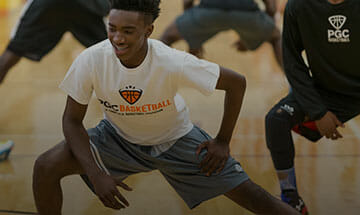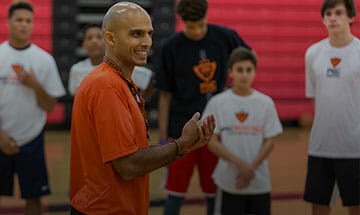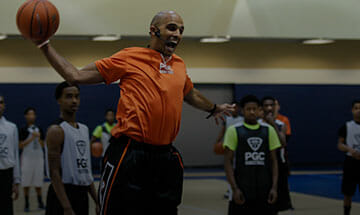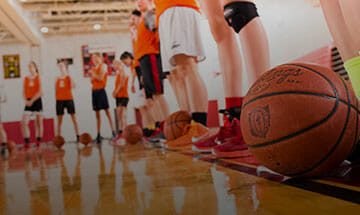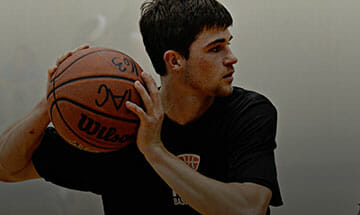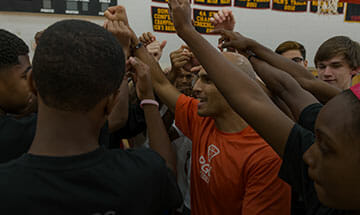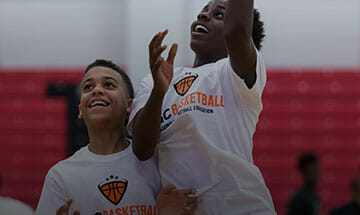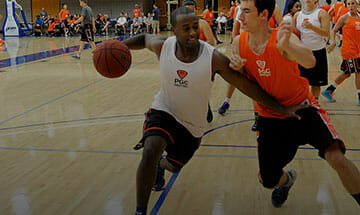The founder of PGC Basketball, Dick was a highly decorated high school and college player who was regarded as the prototypical “coach on the court.” He was named as the best high-school point guard in America by Parade Magazine and went on to earn Academic All-American and Atlantic Coast Conference (ACC) all-star honors at Duke. Later, he played and coached professionally in Europe and South America.
An English major and lover of literature, Dick authored five books during his lifetime—including STUFF! Good Players Should Know, praised as “the ultimate guide to playing the game the right way” by Larry Brown, the only coach ever to win both NCAA and NBA championships. Devenzio was considered by many to be a basketball genius, and Dick’s books continue to influence basketball lovers all over the world and have been translated into several foreign languages.
During college, Devenzio began running his own summer basketball camps, and he continued to offer sessions every summer until his sudden death in 2001 at just 52 years of age. The program he was most proud of, however, was the nationally acclaimed Point Guard Basketball College, the predecessor of PGC Basketball. Although Dick’s ingenuity, humor, and creativity are missed, his principles, ideas and teaching remain at the core of PGC's programs.
Who is Overjoyed at the Thought of Conditioning?
Few athletes are overjoyed at the thought of conditioning. It’s tough. It’s demanding. It causes pain. But everyone has to do it. Conditioning is crucial to success in every sport. The best technique and the most ability won’t help you win if you are too tired to use them. To be a champion, get in great physical condition.
Having an Attitude that Seeks Perfection as a Habit
Being organized is an essential ingredient of productivity. If you want to maximize your time and be as effective as possible, you have to be organized. It’s hard to imagine that you are really trying to maximize your abilities if you aren’t attentive to being personally organized. We’re all human. We all make mistakes. We can’t be perfect at everything. But we can have an attitude that seeks perfection as a habit.
How to Energize Your Practice Sessions
Most every athlete has a vivid imagination. Most of us think often of what it will be like standing in the winner’s circle, or on the winner’s platform, or cutting down a net, being carried off a field, standing at a microphone, being interviewed on national TV. Having a vivid imagination not only helps get you through difficult practices and lonely sessions aimed at improving your skills, it also keeps you energized and on course.
10 More Areas for Honest Self Evaluation
Part Two of How to Evaluate Yourself. Stemming from the need for a standard of personal excellence, I offer a citizenship test or “State of the Person” report card. In brief, here are twenty-one categories or subjects in which I think each person should strive to get an A. In my opinion, all A’s in these would qualify a person to think of himself as approaching excellence as a person in the same way Michael Jordan approached excellence as a basketball player. How do you measure up?
10 Areas for Honest Self Evaluation
How to Evaluation Yourself: Part One. Stemming from the need for a standard of personal excellence, I offer a citizenship test or “State of the Person” report card. In brief, here are twenty-one categories or subjects in which I think each person should strive to get an A. How do you measure up?
What Does Leadership Look Like?
Matt Dyment was a basketball player at Linfield College in McMinnville, Oregon. He is also one of the finest leaders I have ever seen on and off a basketball court. I offer some examples of Matt’s leadership as a yardstick so you can measure your own efforts by comparison.
Mistakes Require Action
In response to an error, Hustle-CAT is a good term to remember and a good thing to do. In all the continuous team sports like basketball, soccer, volleyball, and hockey—and sometimes in baseball and football as well—a player will make a mistake and have the opportunity immediately either to compound the mistake or to correct it. If your error immobilizes you while you pause to demonstrate your anguish or anger, you compound your error.
Great Basketball Players Don’t Make Great Plays
Common sense might seem to tell you that great plays are what make the difference between a good player and a mediocre player. But most coaches would disagree. More often, they would say, great plays—or the attempts to make great plays—are what make good players mediocre.

